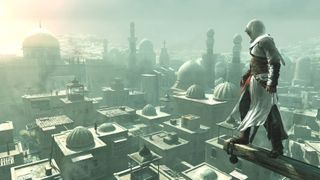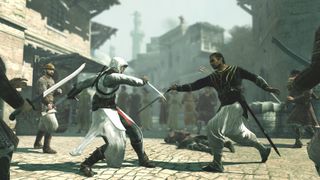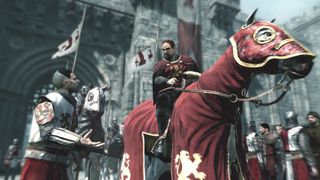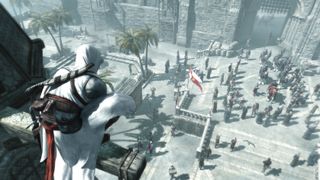The original Assassin's Creed was an awkward, ambitious sign of things to come
Novel ideas save Altaïr from falling on his face.


This article first appeared in PC Gamer magazine issue 353 in January 2021, as part of our 'Reinstall' series. Every month we load up a beloved classic—and find out whether it holds up to our modern gaming sensibilities.
According to Assassin's Creed, the fine people of Damascus, Jerusalem and Acre only had about three lines of employment: carrying breakable vases on their heads, accosting citizens accused of petty crimes, or just getting 30 miles a day in on their medieval Fitbits. It's a far cry from the endless realms of Valhalla, Odyssey and Origins.
The original Assassin's Creed cares not for your RPG mechanics, however, fixating almost solely on exploring the world of the Crusades, collecting intel, and assassinating nine Templar leaders. I've contended for years that its brand of social stealth was where the franchise ought to have focused, rather than going bigger and bigger with each successive entry. I may have been wrong, though.
From the get-go, it's shocking to see an Assassin's Creed game where the protagonist is an unlikable dick. Future entries lived and died by how popular the player character was, and Altaïr is nothing short of a murderous bad boy. Within minutes of knowing him, he stabs an innocent old man in the back, gets one accomplice killed and the other dismembered, and mouths off to his elder like a teething child. When one of Altaïr's fellow assassins chides him for an unnecessary murder, saying "this is not the way," Altaïr responds with "my way is better," which sounds like a phrase you'd see on your 12-year- old cousin's T-shirt.
It doesn't help that Altaïr's voice actor could still land a Razzie by most modern standards. For a game that starts off with the trademark disclaimer about the team's multicultural makeup, hearing a distinctly American voice come out of an ancient Syrian feels like a weird betrayal of that commitment. To be fair, actor Philip Shahbaz is Iranian-American, but little of that identity seems to come through in Altaïr's progression as a character, which unconvincingly transitions from sour grape to remorseful curmudgeon with all the grace of a dead Templar.
Midway through his redemption, Altaïr's leader asks him how he knew he wouldn't kill him as punishment for screwing up. Altaïr's answer is simply, "I took a leap of faith". Woof. To its credit, the ultimate twist of Assassin's Creed's plot (Altaïr's mentor is corrupted by the mystical Apple of Eden, throwing the implied benevolence of the assassin brotherhood into disarray) massively pays off throughout the rest of the series. We like to harp on Ubisoft for being 'apolitical' with its storytelling, but the historical fiction of the Assassin vs Templar wars has provided for plenty of multilayered characters and motivations without it feeling like 'both sides' stupidity. Knowing the Brotherhood is fallible makes its victories and failures that much more meaningful.

Side dishes
Assassin's Creed's strongest portions to this day remain the assassinations themselves. To get to them, though, you have to slog through a city's side missions, which include identical tasks like pickpocketing, beating up rabble-rousers in alleys, or rooftop running time trials. That's it for variety, and the inclusion of hundreds of collectible flags doesn't help, but I did appreciate that reconnaissance missions actually gave me a small piece of intel that could, in theory, play into my final assassination.
An early bit of investigation led me to discover that my target, a Templar surgeon in charge of a ward full of mentally ill people, often focuses on his patients to the detriment of his immediate surroundings, making him an easier target. It's nowhere near the depth of more immersive games, like stumbling upon some casual cannibalism in a Fallout 3 town, but it does give you a little more familiarity with your target. Not enough to feel anything terribly personal towards them, but that's where another part of Assassin's Creed comes in to play.
The biggest gaming news, reviews and hardware deals
Keep up to date with the most important stories and the best deals, as picked by the PC Gamer team.
Though these days it feels like Ubisoft is more known for huge open worlds, it's impossible to miss how Assassin's Creed influenced the arc of post-2007 storytelling. Each assassination mission kicks off with a cinematic introduction to your target just as you walk up, almost never ripping away from your perspective. When Altaïr finally plunges the good ol' wrist-blade into his back, players are treated to a sort of side-stage conversation between the two. Each victim gets their monologue, ripping into Altaïr with the bravado you'd expect of a villain, but also with the genuine grief that he could not see the world the way they did.
Though future entries did it with more flair, it's striking that Assassin's Creed was confident enough in its storytelling to sow seeds of doubt in its player. But what is a narrative without a world to tell it in? It's crazy to think that Ubisoft believed it could get away with designing three major cities, an assassin village and a sizeable overworld connecting it all.

City slicker
And you know, Ubisoft didn't get away with it. Despite Jerusalem, Damascus and Acre being very different regions, each city feels bereft of cultural signifiers besides one or two notable landmarks, like the Dome of the Rock in Jerusalem or the port in Acre. Even worse, each city was seemingly built by the same architect, each building a basic square or triangle as if shunted into place like a Lego block rather than naturally layered over the years. This makes each place feel far too similar to the last.
I wonder too how confident Ubisoft was in its climbing tech at the time, considering Altaïr gets tripped by anything other than a 90-degree angle. There's nothing quite like leaping over three support beams, swinging through a merchant's stand with some impeccable animation, and eagle-diving into some hay.
Consider me still very impressed by the controls, where Ubisoft assigned each side of your body to your controller's face buttons. It forces you to be conscious of how you're using your body in the moment, be it to shove a man out of the way or sidle around his guard. Nowadays, even Valhalla relies on a fairly standard light and heavy attack system that only considers your body when it's time to dual-wield shields.
Then there's the overworld that connects the cities, a large yet surprisingly linear procession of huts and military camps bookmarked only by more towers to climb. It's weird because it shows the scope of Ubisoft's ambition years before it would really nail it. I'd wager it was meant to house much more to do, but instead we just get some innocuous horseback riding.

There's also a number of NPCs that haven't aged well, including the homeless people exhibiting signs of mental illness who violently shove you, or the small army of beggars that always happen to be women. To Ubisoft's credit, the cast is well-rounded with (mostly male) actors representative of each region.
I realise I've spent much of this ragging on Assassin's Creed, but it's easy to see why this franchise took off the way it did, save for a few resets. Hitman was already on the scene as a sort of social stealth experience, but Assassin's Creed was truly a next-gen horsepower showcase, and it wasn't afraid to show that off. The camera is closer to the player, more intimate, and not so much the typical third person of recent tries. The pacing is nowhere near the breakneck speed of Valhalla, but to see Middle Eastern cities realised so expansively was groundbreaking for the time.
Assassin's Creed is a testament to Ubisoft's strengths as a studio, where scope was just a word and every gamer's natural instinct for historical murder tourism can be explored with some genuine zeal. Altaïr may be a fumbling mess at many times, but he walked so we could run.
Joseph Knoop is a freelance writer specializing in all things Fortnite at PC Gamer. Master of Creative Codes and Fortnite's weekly missions, Joe's always ready with a scoop on Boba Fett or John Wick or whoever the hell is coming to Fortnite this week. It's with a mix of relief and disappointment that he hasn't yet become a Fortnite skin himself. There's always next season...
Most Popular


